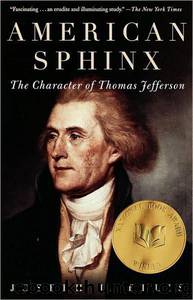Joseph J. Ellis by unknow

Author:unknow
Language: eng
Format: epub
Tags: Jefferson; Thomas, Jefferson; Thomas - Psychology, Presidents & Heads of State, Fiction, United States, Historical, Revolutionary Period (1775-1800), Biography & Autobiography, History
ISBN: 9780679764410
Publisher: Random House Digital, Inc.
Published: 1997-01-02T06:00:00+00:00
Or if one were searching for a classic rendering of the principle of free speech, no American statesman had ever put it so succinctly: “If there be any among us who would wish to dissolve this union or to change its republican form, let them stand undisturbed as monuments of the safety with which error of opinion may be tolerated where reason is left free to combat it.” Or to take a final illustration out of several equally eloquent entries, there is this concise formulation of America’s domestic and foreign policy goals: “Equal and exact justice to all men, of whatever state or persuasion, religious or political; peace, commerce, and honest friendship, with all nations—entangling alliances with none.” It was Jefferson, not Washington, who coined the term “entangling alliances.” 22
But the most oft-quoted words, which can also reach across time as a lyrical expression of transcendent truth, are in fact fully comprehensible only when seen within the context of American politics in 1801. Apart from the natural rights section of the Declaration of Independence, this is probably the most famous political statement that Jefferson ever made: “But every difference of opinion is not a difference of principle. We have called by different names brethren of the same principle. We are all republicans—we are all federalists.” This was also the passage that virtually all the reporters and interested observers fastened upon at the time because it seemed to represent Jefferson’s clear, indeed grand, statement of conciliation and moderation. It signaled that the bitter party battles of the 1790s would not continue in the Jefferson presidency, that the incoming Republicans would not seek revenge for past Federalist atrocities like the Alien and Sedition Acts and, most significant, that Jefferson’s understanding of “pure republicanism” did not mean a radical break with Federalist policies or a dramatic repudiation of the governmental framework established in the Constitution. Hamilton spoke for the relieved Federalists who viewed the address as “a candid retraction of past misapprehensions, and a pledge to the community that the new President will not lend himself to dangerous innovations, but in essential points will tread in the steps of his predecessors.” 23
But Jefferson did not really mean what Hamilton and all the other commentators thought they heard him say. Part of the problem was actually a matter of translation. In the version of his address printed in the National Intelligencer and then released to the newspapers throughout the country, the key passage read: “We are all Republicans—we are all Federalists.” By capitalizing the operative terms, the printed version had Jefferson making a gracious statement about the overlapping goals of the two political parties. But in the handwritten version of the speech that Jefferson delivered, the key words were not capitalized. Jefferson was therefore referring not to the common ground shared by the two parties but to the common belief, shared by all American citizens, that a republican form of government and a federal bond among the states were most preferable. Since one would have been
Download
This site does not store any files on its server. We only index and link to content provided by other sites. Please contact the content providers to delete copyright contents if any and email us, we'll remove relevant links or contents immediately.
What's Done in Darkness by Kayla Perrin(25538)
Shot Through the Heart: DI Grace Fisher 2 by Isabelle Grey(18250)
Shot Through the Heart by Mercy Celeste(18195)
The Fifty Shades Trilogy & Grey by E L James(17805)
The 3rd Cycle of the Betrayed Series Collection: Extremely Controversial Historical Thrillers (Betrayed Series Boxed set) by McCray Carolyn(13223)
The Subtle Art of Not Giving a F*ck by Mark Manson(12961)
Scorched Earth by Nick Kyme(11871)
Stepbrother Stories 2 - 21 Taboo Story Collection (Brother Sister Stepbrother Stepsister Taboo Pseudo Incest Family Virgin Creampie Pregnant Forced Pregnancy Breeding) by Roxi Harding(11115)
Drei Generationen auf dem Jakobsweg by Stein Pia(10249)
Suna by Ziefle Pia(10206)
Scythe by Neal Shusterman(9303)
International Relations from the Global South; Worlds of Difference; First Edition by Arlene B. Tickner & Karen Smith(8664)
Successful Proposal Strategies for Small Businesses: Using Knowledge Management ot Win Govenment, Private Sector, and International Contracts 3rd Edition by Robert Frey(8455)
This is Going to Hurt by Adam Kay(7748)
Dirty Filthy Fix: A Fixed Trilogy Novella by Laurelin Paige(6488)
He Loves Me...KNOT by RC Boldt(5835)
How to Make Love to a Negro Without Getting Tired by Dany LaFerrière(5436)
Interdimensional Brothel by F4U(5333)
Thankful For Her by Alexa Riley(5203)
